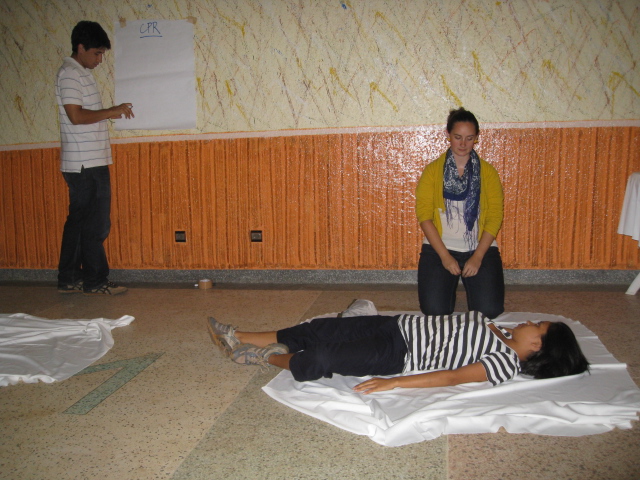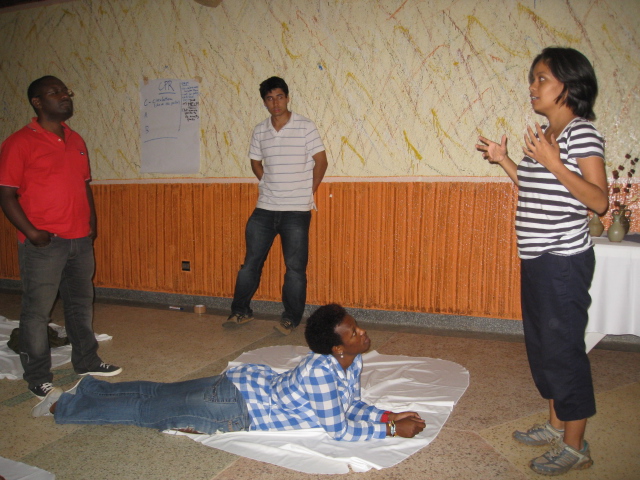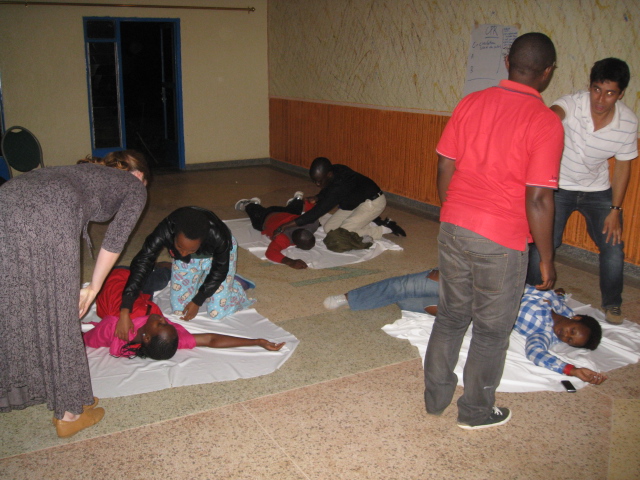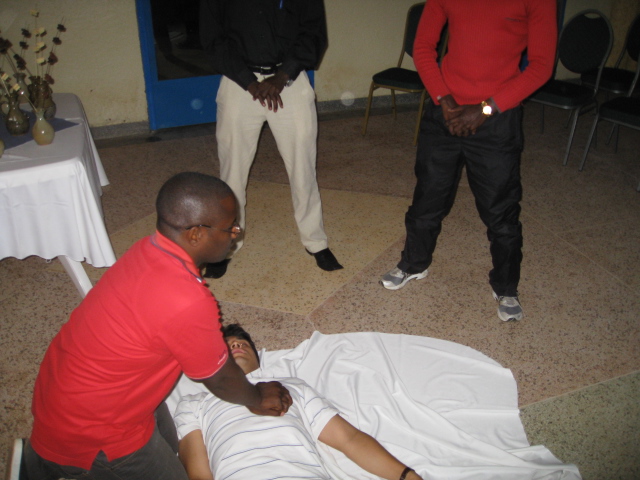Returning from a field visit one day with my co-fellow Adeline, our car was stopped to help with an unexpected situation. A boy had jumped into a nearby lake and could not be found. When we arrived, I asked Adeline why no one was in the water looking and she told me that no one there knew how to swim well enough to have the confidence to jump in and try to find the boy. As a former lifeguard, I decided I had to do all I could to help. Following questions on safety and a lot of chaotic translation and help from Adeline, I jumped in. After a few minutes without success in finding the boy, I was able to persuade one man who could swim to get in and help. Together, we found the boy and pulled him from the water. In the moments that followed, I administered CPR to the best of my skills. While I was giving CPR, I asked Adeline to call a doctor to confirm I was doing all that I could. Upon receiving all the details of the rescue, the doctor said that it had likely already been too late to save him by the time we had found his body and that I needed to accept this and stop chest compressions.
After stopping CPR, the boy’s father finally arrived, having been called down from the field where he was tending his goats. Those that had gathered told him that his son had jumped into swim but did not come back up, and the muzungu (a reference to me — a word commonly used in Kinyarwanda to refer to foreigners) had done everything she could for him, The father told us that this was his only child, and his wife had died, so he was now left all alone. When I heard this, I was consumed with feelings of guilt and failure. I felt so ashamed, so devastated, and so powerless. There was no ambulance and no one yelling out “I’m a doctor!” and coming to the rescue that day. I wasn’t a hero, and there was no miraculous save like Baywatch prepares you to expect. Just a 13 year old boy, chest swollen with water and lifeless, despite all the muzungu girl’s efforts.
Drownings happen everywhere, and I can’t expect that things would have ended differently in the US. Regardless, the reality is that this was a completely unnecessary death, and one that might have been prevented if more resources and education were present.
What disturbs me most is how many stories like this must go unheard around the world. And why? I wonder if for some, it is easier to continue a life without personal obligation or empowerment to do something about a statistic we hear if we don’t have the face of a lifeless child in mind to humanize the problem. Or if even worse, are we desensitized to these stories because they feel so far from our own reality, and so we choose not to listen or let them impact us? I know that for me, this has been somewhat true in the past. I have spent two months reflecting on this. I have experienced various stages of grief and confusion and come to appreciate this as a great lesson for me. First, experiencing this with Adeline was a great opportunity for growing in our cultural understanding and our friendship. I was so glad she was there that day, and grateful for our ability to be honest with one another during and after this experience. Second, this lesson is an enduring reminder of why I have chosen to work in global health and why I wanted to be a GHC fellow in the first place. Many things that could have altered the outcome of this tragedy are being actively addressed by the government and their programs here, and in partnership with the organization I am working for in my fellowship year (and many other fantastic health organizations in Rwanda). There are many in Rwanda dedicated to relentlessly working towards improving all types of health services for all Rwandan citizens. There have already been huge strides in increasing access to public health knowledge and emergency services, and in decreasing preventable deaths. The work continues so that everyone may have equal access to resources necessary for health – resources we often take for granted or perhaps even vote against having equal access to because we forget the difference they make in our lives in the US. There is still plenty more work to be done here, and I am glad to join the effort. I am so grateful to be gaining work experience in such a country, during an exciting time in global health when so much energy is placed on these issues.
Returning to work the next day, I was changed. Numbers on a spreadsheet were no longer just data. Replacing disconnected concern was a child’s face, a real person I could associate these numbers with.
Now there is more to the global health story for me, more to the statistics we discuss of unnecessary deaths, illness, and lack of access to care. I realized that this was my mango lady moment. Life has a new layer of reality to me, one that includes death, early, unfair and needless death due to poverty and structural violence. At times, I wish for a return to ignorance, for the world in which this reality exists is much scarier to wake up to. Ultimately, though, it is empowering and engrossing. I know that I am capable of helping in some capacity to make things a little bit better for someone. In this experience, I could not bring that boy back to life. I could not take that father’s pain away or even lessen my own. But I could, and did, show others standing by that you can help someone in need, just through use of swimming and CPR skills. I inspired someone else to have the courage to get in the water and help me search. I gave the father his only son’s body for closure and the chance for a proper, respectful burial. I learned how much I truly care about life, social justice, and global health equity, and that I can be brave enough to join the fight. Most of all, I gave a piece of myself, a piece of my humanity, innocence, and vulnerability.
Because of this experience, I decided I could continue to help by teaching CPR at the GHC Quarter 1 Workshop. At the workshop, I was feeling discouraged about not accomplishing anything “major” my first quarter here and fighting off feelings of failure. Then someone pointed out to me that teaching CPR was a major accomplishment. One that really could save someone’s life one day.




My everyday life in Rwanda does not usually consist of life and death matters. Most of my days are spent on a computer, using data to inform program improvement. Over the last few months, I have learned that leadership does not just come from grand triumphs and rare successes unattainable to most people. Often, becoming a good leader happens behind the scenes through the small stuff, like data gathering and spreadsheet creations. It grows out of dedication, integrity, handling life’s failures without giving up, and the love we share with others in the day-to-day.
There is so much more to this story. Even as I tell it, I do not know all the details about the boy or how his life was celebrated and mourned after this heartbreaking day. What I do know is that I am willing to share my piece of it, to learn from it, and to open myself up to hearing more stories that will inspire and obligate me to do more. I may not be a newsworthy leader, inspiring millions or rescuing people David Hasselhoff style, but I can still lead in everyday things like training others to use data to inform decisions in quality of care and program improvements, giving CPR classes and telling my story. In doing so, I hope I can also give others something to help humanize the statistics they hear so often, and maybe even inspire some to action.
Next on my list, swimming lessons!
{For more on this, follow my personal blog at: www.alterethos.wordpress.com}
